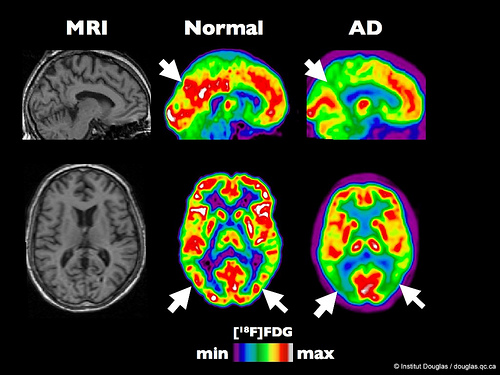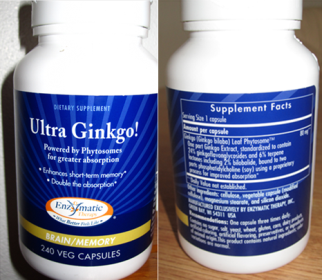Prevention of Alzheimer's disease?
First, let’s
understand Alzheimer’s disease (sometimes referred to as just
Alzheimer’s) and what effects it can have on the body. Alzheimer’s
disease is a common form of dementia that is the (usually slow)
degeneration of normal brain functions. Some symptoms to diagnose
Alzheimer’s include memory loss, confusion, disorientation, changes in
mood, behavior, and personality, and lack of initiative.

* Picture above shows an MRI scan of a person's brain without
Alzheimer's disease and a person with Alzheimer's disease. This picture
is courtesy of Institute Douglas from flickr.com.
Ginkgo biloba was first thought
to help prevent against Alzheimer’s disease
because a few studies reported positive effects linking slower
progression of brain degeneration and Ginkgo biloba extract. These cases
showed mainly an increase in memory. For years, people have been using
the Ginkgo biloba as preventative caution against Alzheimer’s, but today
some scientists believe that we may have over estimated its effects.

Today, more and more studies are showing that the Ginkgo biloba isn’t
any more helpful than a placebo to prevent against Alzheimer’s. These
studies were usually done with a great number of patients over many
years. There is one specific study called the GEM (Ginkgo Evaluation of
Memory) study that many scientists as well as doctors refer to when
asked about Ginkgo biloba and its effects on Alzheimer’s. According to
the U.S. Department of Health and Human Services, “GEM is the largest
clinical trial ever to evaluate ginkgo’s effect on the occurrence of
dementia.” Steven T. DeKosky led the experiment and it consisted of
3,069 participants who took either a placebo or 120 mg of Ginkgo biloba
twice a day totaling 240 mg per
day. The experiment lasted for eight
years. The results showed that those who took the G. biloba and those
who took the placebo had almost the exact same number of people who were
diagnosed with dementia, further proving that the Ginkgo biloba has a
very small, if any, significance on Alzheimer’s disease. (For more in
depth
results from this experiment click
HERE.) The experiment also showed
that side effects for the G. biloba are very rare and if a patient
happened to show some side effects they usually were a headache,
stomachache, or rash.
 Some scientists say Ginkgo biloba extract has a positive effect
on preventing Alzheimer’s. Some say it has no effect. Either way, there
needs to be more research done to prove the interaction between Ginkgo biloba
and Alzheimer’s disease or Dementia. Ginkgo biloba
has proven to that it can enhance short-term memory due to the opening
of blood vessels around the brain, but more research must be done to prove its effects on
Alzheimer’s disease.
Some scientists say Ginkgo biloba extract has a positive effect
on preventing Alzheimer’s. Some say it has no effect. Either way, there
needs to be more research done to prove the interaction between Ginkgo biloba
and Alzheimer’s disease or Dementia. Ginkgo biloba
has proven to that it can enhance short-term memory due to the opening
of blood vessels around the brain, but more research must be done to prove its effects on
Alzheimer’s disease.
Now that we see how Ginkgo biloba can affect us, go to INTERACTIONS to discover how the
Ginkgo biloba can affect other organisms.
HOME
